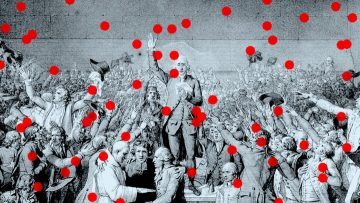Rebecca Spang in The Atlantic:
 Fear sweeps the land. Many businesses collapse. Some huge fortunes are made. Panicked consumers stockpile paper, food, and weapons. The government’s reaction is inconsistent and ineffectual. Ordinary commerce grinds to a halt; investors can find no safe assets. Political factionalism grows more intense. Everything falls apart. This was all as true of revolutionary France in 1789 and 1790 as it is of the United States today. Are we at the beginning of a revolution that has yet to be named? Do we want to be? That we are on the verge of a major transformation seems obvious. The onset of the next Depression, a challenge akin to World War II, a national midlife crisis—these comparisons have been offered and many more. But few are calling our current moment a revolution, and some have suggested that the coronavirus pandemic—coinciding as it has with the surge in Joe Biden’s bid for the Democratic presidential nomination and the decline of Bernie Sanders’s—marks the end of any such possibility. “The Coronavirus Killed the Revolution,” declared the headline of a recent essay in The Atlantic by Shadi Hamid, who argued that the COVID-19 crisis makes people crave “normalcy” over deep structural change. As a historian of 18th- and 19th-century France, I think claims like these are mistaken.
Fear sweeps the land. Many businesses collapse. Some huge fortunes are made. Panicked consumers stockpile paper, food, and weapons. The government’s reaction is inconsistent and ineffectual. Ordinary commerce grinds to a halt; investors can find no safe assets. Political factionalism grows more intense. Everything falls apart. This was all as true of revolutionary France in 1789 and 1790 as it is of the United States today. Are we at the beginning of a revolution that has yet to be named? Do we want to be? That we are on the verge of a major transformation seems obvious. The onset of the next Depression, a challenge akin to World War II, a national midlife crisis—these comparisons have been offered and many more. But few are calling our current moment a revolution, and some have suggested that the coronavirus pandemic—coinciding as it has with the surge in Joe Biden’s bid for the Democratic presidential nomination and the decline of Bernie Sanders’s—marks the end of any such possibility. “The Coronavirus Killed the Revolution,” declared the headline of a recent essay in The Atlantic by Shadi Hamid, who argued that the COVID-19 crisis makes people crave “normalcy” over deep structural change. As a historian of 18th- and 19th-century France, I think claims like these are mistaken.
The United States may not be having a revolution right now, but we are surely living in revolutionary times. If we do not perceive them as such, it is because news coverage and everyday conversations alike turn on nonhuman agents. Instead of visionary leaders or outraged crowds, viruses, markets, and climate change seem to shape events today. History feels like it is out of our hands. People sometimes imagine yesterday’s revolutions as planned and carried out by self-conscious revolutionaries, but this has rarely, if ever, been the case. Instead, revolutions are periods in which social actors with different agendas (peasants stealing rabbits, city dwellers sacking tollbooths, lawmakers writing a constitution, anxious Parisians looking for weapons at the Bastille Fortress) become fused into a more or less stable constellation. The most timeless and emancipatory lesson of the French Revolution is that people make history. Likewise, the actions we take and the choices we make today will shape both what future we get and what we remember of the past.
More here.
